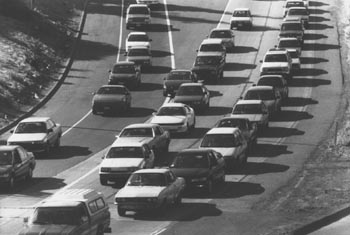TIME EXPOSURE
A DOCUMENTARIAN LOOKS AT THE RAT RACE
by MIKE CASSIDY
BOB GLINER is a busy man.
The San Jose State University sociologist teaches. He's served as department chair. He's traveled to Europe, Africa and Asia to make 22 documentaries about the world's social problems. He commutes on Highway 17.
Which is an inspiration. It focused him on a problem closer to home: time. Or lack of it.
''This is probably the best place,'' Gliner, 56, says, ''to address where the First World is going in terms of time issues.''
Silicon Valley defined Internet time. It's a place where ideas must become products overnight. Where the bottom line is the scoreboard.
Gliner had seen signs for years. College students stepping out of class to take cell phone calls. The growing frenzy and frustration of the commute. Fifteen-hour work days. Scenes that were talked about as if they were normal. But he knew they were not normal.
He saw a documentary in it all.
''I just talked to everybody I knew about who would be good to talk to about this subject.''
It's what he does. Gliner , a veteran San Jose State professor, knows all about publishing papers and giving talks. But he's convinced a documentary can sometimes do the job better. Films reach a bigger and broader audience, even if they're aired on the smallest PBS station. And sources are more likely to sit for an interview when appearing on TV is the payoff.
''There is something about the magic of television,'' Gliner says.
It's been magic for him. He is a self-taught filmmaker, who has learned to run the camera, monitor sound and ask the questions all at once. He works quickly, typically taking four months to turn out an hour documentary. He has to rush, he says. Someone else might tell the story first. The material might become outdated.
Which gets us back to Silicon Valley and the time frenzy. Gliner worries about the toll the mad rush to the next big thing takes on families and health and communities. In his latest film, ''Time Frenzy,'' he found a rich cast of characters to illustrate those concerns.
There is the French immigrant who says he was worried about ever getting to know any co-workers at Hewlett-Packard. After three weeks, a colleague asked him to lunch and the newcomer was thrilled. Then, the new worker says, the two walked to the company cafeteria, loaded up their trays and walked back to their separate cubes to eat.
''They didn't even talk,'' Gliner says.
There is the working mother who commutes long-distance. The successful 20-something start-up guys who conclude that success breeds paranoia and a greater urgency to keep ahead. The doctor who sees stressed-out patients who tell him they don't even have time to be treated. Do they really have to work 60 or 70 hours a week? He asks them. It's that, they answer, or lose their jobs.
''When is anybody ever going to step back and say, 'What are we doing with our society?' '' Gliner asks. He doesn't have the big answer, but maybe he's found a little one.
Gliner begins a yearlong sabbatical next month.
| Home |

